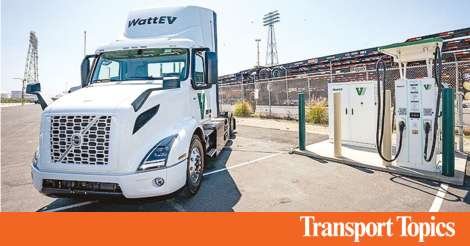WattEV charging depot at the Port of Long Beach. (WattEV)
[Stay on top of transportation news: Get TTNews in your inbox.]
LAS VEGAS — WattEV CEO Salim Youssefzadeh issued a challenge to Class 8 truck makers May 22, promising to place an order plus deposit immediately for 1,000 Class 8 trucks with any manufacturer if the rigs will be ready by 2026 and come with megawatt charging system (MCS) capabilities.
Speaking on the sidelines of Advanced Clean Transportation Expo 2024, Youssefzadeh told Transport Topics that the medium- and heavy-duty electric truck charging infrastructure developer has the money for the trucks.
Youssefzadeh’s bold promise came hot on the heels of WattEV announcing it plans to increase the size of its fleet of 36 battery-electric trucks to more than 180 by the end of 2024 — trucks that would be used by WattEV Transport, the company’s Truck as a Service unit.
“We’ve been using and testing trucks in our fleet from all the major original equipment manufacturers,” Youssefzadeh told attendees of the conference and reporters at a news conference, adding that WattEV expects to take delivery of 53 trucks in June from TEC Equipment, a Volvo VNR Electric dealer.
“We value our long-standing relationship with TEC Equipment and have accelerated the delivery of our orders after verifying range and charge rate,” WattEV’s top executive said.
“We’ve been using and testing trucks in our fleet from all the major original equipment manufacturers,” Youssefzadeh says at ACT Expo 2024. (Keiron Greenhalgh/Transport Topics)
Once its fleet is expanded to 89 trucks, WattEV plans to take delivery of an additional 100 trucks under order from different OEMs, bringing its total fleet capacity to 189 Class 8 BETs, which the company said would mark the largest deployment among electric commercial fleet operators. WattEV Transport is aimed at supplying owner-operators.
All future WattEV depots will include MCS charging, Youssefzadeh said earlier in May. WattEV opened a battery-electric charging depot in Bakersfield, Calif., on May 6, its largest yet. The site took three years to build at a cost of $20 million and has three MCS chargers alongside 16 dual-cord 360-kW chargers and 15 single-cord 240-kW combined charging system (CCS) chargers.
A 119-acre site, the truck stop includes a solar-powered microgrid with a battery energy storage system.
All of WattEV’s sites will offer CCS and MCS, Youssefzadeh said when the Bakersfield depot was opened. WattEV, which has five depots, has a pipeline of at least 15 facilities as it looks to build out a West Coast charging network. Youssefzadeh expects all 15 sites to be operational within the next two years.
“We have demonstrated that the infrastructure for heavy-duty truck transport with MCS — and the necessary power — is available today and can be expanded,” Youssefzadeh said. “With the availability of trucks at the right price point with fast-charging capability and necessary range, we’re confident market adoption will increase rapidly.”
WattEV also expects to expand outside the U.S. “fairly soon,” he said at ACT, without providing more details.
Source link
#WattEV #CEO #Challenges #Truck #Makers #Megawatt #Charging



